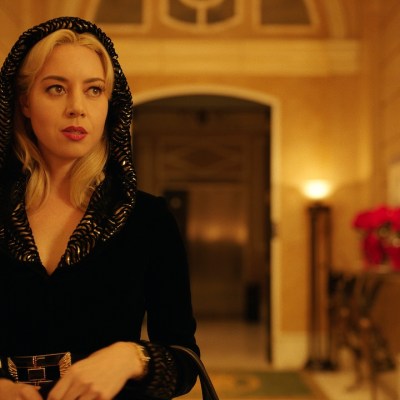Megalopolis Bombing at the Box Office Won’t Matter in the Long Run for Coppola
Megalopolis is a box office disaster. But the movie will long outlive any Monday morning snickering.

Francis Ford Coppola’s Megalopolis had a rough opening weekend. A film that reportedly cost $120 million—most of it self-financed by the filmmaker after he sold a portion of his winery business—the epic is estimated to have grossed a mere $4 million in its first three days. That’s not even enough to crack the top five for the weekend.
Ultimately, Megalopolis opened in sixth place, behind movies like Beetlejuice Beetlejuice and Speak No Evil, which are in their fourth and third weekends, respectively, as well as The Wild Robot, which opened at number one—a movie that is also, by the by, magnificent.
This is an unquestionably grim turn of events for a movie that Coppola screened first for studios in the spring and then at Cannes for the international film industry, including critics. At both events, Coppola pursued not only recouping some of his investment, but also acquiring major commitments from a distributor for an awards season play, which the filmmaker was reportedly convinced Megalopolis could be a frontrunner in. While he did eventually find a distributor, it was with Lionsgate, a studio that does not traditionally make big awards splashes (though there are exceptions, see for example La La Land). Furthermore, reports suggested the deal did not compensate Coppola for the investments he already sank into the film, and instead required the director to self-finance another $15 to $20 million for the marketing expenses.
All of which has culminated in the shape of a box office bomb that will probably be studied for years to come within the industry, and snickered about for a few days and weeks online. Yet, in the end, I’m not sure it will matter that much to Coppola or for what he is trying to achieve.
While a recent opinion piece by Sam Wasson in the Times suggests Coppola has already begun imagining another film he’d like to make, this one being a musical, the truth is the filmmaker is 85 years old. And he spent 40 years thinking about Megalopolis before he finally made it. There remains a decent chance that Megalopolis will be his final film. He certainly tackled the movie with the verve and ambition of an artist who was out to make a grand, and potentially lasting, statement about the meaning of creation and existence.
Admittedly, Coppola and Lionsgate got some fairly awful publicity last month after the studio ran a trailer with AI-generated quotes from deceased critics supposedly maligning the director’s most popular works, including The Godfather or Apocalypse Now. Those quotes were fake and revealed a startling lack of due diligence or competency somewhere in the marketing department. But as embarrassing (and thin-skinned) as that miscue was, it’s not hard to imagine that Coppola is a filmmaker who’s felt like the knives have been out for him from nearly the beginning. Ever since he won his first Oscar for co-writing Patton at age 30, and his first Best Picture award for directing The Godfather while only 32, his popularity was quickly matched by the anticipatory schadenfreude eager to see his growing hubris stumble and fall.
Apocalypse Now was mockingly called “Coppola’s Folly” in the press, with many eager to see the movie he spent two years making in the jungle blow up in a puff of smoke ahead of its Cannes premiere in 1979. Instead it won the Palme d’Or. Not even 15 years later, Coppola “slumming” in something as lurid and threadbare as “another” Dracula movie produced a similarly gleeful strain of negativity in the press ahead of release. That film also turned out to be much more surrealist and strange than was typical for a Hollywood horror, and some cynics japed it would be Coppola’s “Bonfires of the Vampires.” (This was in reference to the then recent and spectacular failure of Brian De Palma’s Bonfire of the Vanities adaptation.)
Both of those movies of course proved to be box office hits and are considered classics today, with Apocalypse Now furthermore being generally recognized as one of the greatest films ever made. Yet here we are, after decades of gossiping, with the red meat finally on tap in 2024. The latest (and final?) Coppola epic is a financial quagmire and a critical failure. One need not turn to AI to generate the negative pull-quotes from this thing—personally I found Megalopolis to be an unfinished, if periodically fascinating, mess. It’s a failure of reach exceeding grasp.
Yet that is just one opinion, formed by engaging with a refreshingly original piece of art. And the thing about Megalopolis is that Coppola didn’t make it to turn a profit in September 2024. He made it as a grand statement on art, and perhaps life, in modern America. And by virtue of being a closing statement from one of the great authors in his medium, Megalopolis will always have value to be watched, discussed, debated… and maybe eventually reappraised.
It’s not even the first time the filmmaker ran into a public failure. Forty-two years ago, Coppola released the almost painfully well-titled One from the Heart. The film was intended to be the first in a new wave of American cinema produced by Coppola’s American Zoetrope, a production company that the filmmaker had at last turned into a bonafide studio. In theory, it would have been an independent distributor who could compete with the traditional Hollywood majors, but this one would let filmmakers create anything they want with minimal interference.
One from the Heart is also an aesthetically beautiful movie. Megalopolis might have strived for submerging audiences into an artificial fantasia, but One from the Heart genuinely did. But the movie is similarly tepid as a narrative, with the characters and emotions remaining dissonant and uninvolving. Still, the film attracts its admirers and defenders four decades on by virtue of being a Coppola movie.
Conversely, its failure was a deep shame in its time. The industry ultimately followed Coppola’s friend George Lucas down the path of franchised familiarity versus artistic daring, and Coppola at that stage in his life found himself on tenuous financial footing due to the film flopping and taking American Zoetrope Studios with it. Still, even American Zoetrope didn’t really go away.
As a production company, Zoetrope continued to produce later Coppola movies, both hits like Bram Stoker’s Dracula, and flops like this weekend’s Megalopolis. Also just as Coppola once used it to finance new movies from young and untested friends, like Lucas back in his THX 1138 and American Graffiti days, he would later use it to produce Agnieszka Holland’s The Secret Garden, Bill Condon’s Kinsey, and Sofia Coppola’s early triumphs, including The Virgin Suicides and Lost in Translation.
Francis Ford Coppola will clearly lose a fortune on Megalopolis. But unlike his One from the Heart days, he can now afford to. After all the numbers are added and subtracted, the movie will remain forever. Audiences, critics, and aspiring filmmakers can engage with it next week or in 50 years, and maybe they’ll gain something new from the experience. I have my doubts, but for a film where the central character literally says “don’t let the now destroy the forever,” one bad or even disastrous weekend at the box office means almost nothing in regard to how you or later generations will relate to a film. In the end, the forever wins.


